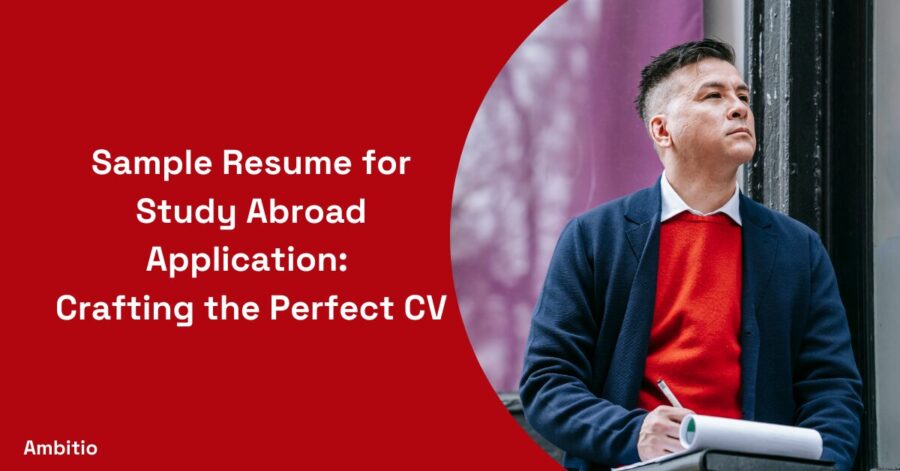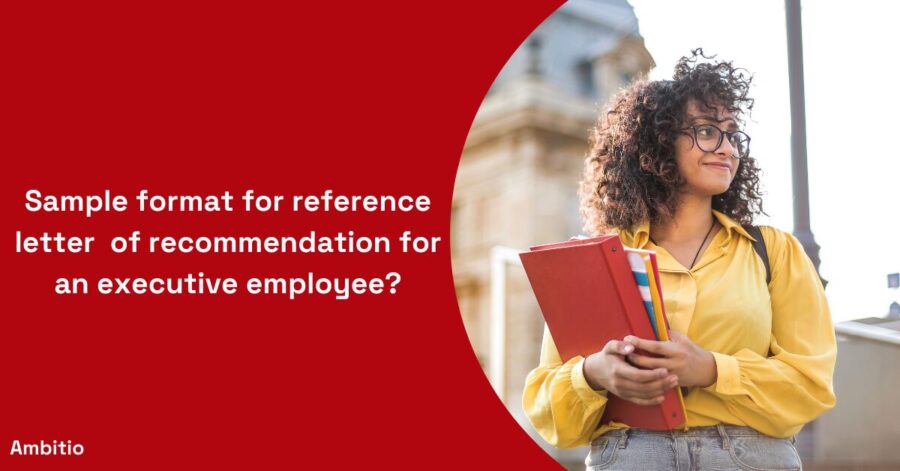27 February 2025
6 minutes read
Sample Resume for Study Abroad Application: Crafting the Perfect CV

Key Takeaways
- A sample resume for study abroad application should highlight academic background, work experience, and relevant skills in a concise, professional format.
- Tailoring the resume to the university and program by emphasizing coursework, research, and extracurricular activities increases the chances of admission.
- Strong formatting, clear sections, and well-structured content help international students showcase competencies effectively to admissions committees.
Global study is once-in-a-lifetime for worldwide education-seeking students that involves tonnes of exposure in different environments, academic success, and working life in working environments. Students should prepare compatible documents, in the form of professionally typed curricula vitae (CVs), to submit them along with their profession background, qualifying education, and potential to respective potential recruiters, employers, and admission panels.
This piece will assist you in making a powerful CV (resume) that is brief and pertinent to the position, contains your complete name, contact information, phone number, and e-mail, and displays your education section in reverse chronological order.
Why a Resume (CV) for an International Student is Crucial for Studying Abroad?
A well-written resume (CV) recommended by LinkedIn and others also considered it an essential document for students applying to study abroad. It is a first impression for recruiters, hiring managers, and admissions committees, which enables them to determine if your skills and abilities match their requirements.

A CV for an international student should be concise, emphasise your transferable skills, and highlight your education, work history, language proficiency, and industry-specific experiences. It is a good idea to include coursework, project management skills, certifications, and relevant experiences that make you a strong applicant.
Sample Resume Template for Study Abroad Applications
A resume for foreign students who are applying to overseas universities must be well-organized, brief, professional, and according to the specifications of the program.
Below is a sample resume that an applicant can refer to:
[Your Full Name]
[Your Address] | [Your Email] | [Your Phone Number] | [LinkedIn Profile]
Professional Summary
A results-driven [Your Major] student with a strong academic background and practical experience in [Your Field]. Eager to study [Program Name] at [University Name] to develop skills in [Key Study Area]. Exemplifies competence in research, teamwork, problem-solving, and project management, with a dedication to academic achievement.
Education
[Your Most Recent University], [City, Country]
Degree: [Your Degree, Major] | Expected Graduation: [Year]
Relevant Coursework: [List Key Courses] | GPA: [Your GPA]
[Previous Institution (if applicable)], [City, Country]
Degree: [Your Degree, Major] | Graduation Year: [Year]
Work Experience
[Job/Internship Title], [Organization Name], [City, Country]
[Start Date – End Date]
- Carried out research and analysis in [Relevant Field].
- Worked with cross-cultural teams to enhance problem-solving.
- Utilized project management and technical skills to deliver major initiatives.
Skills & Competencies
- Technical Skills: [Programming, Research, Data Analysis]
- Soft Skills: [Leadership, Communication, Problem-Solving]
- Language Proficiency: [Languages and Proficiency Level]
- Project Management: [Experience in Handling Projects]
Extracurricular Activities & Leadership
- [Leadership Role, Organization] – Planned events, spearheaded initiatives.
- [Volunteer Work] – Assisted with outreach efforts in communities.
- [Other Activities] – Displays a diverse and interdisciplinary set of abilities.
Certifications & Further Courses
- [Certification Name], [Issuing Organization, Year]
- [Relevant Online Course], [Platform/University]
References
Available on request.
What are the Essential Sections to Include in Your Study Abroad Resume (CV Template)?
Given below is a detailed list of the different sections to be included in your CVs.

Don’t forget that this applies when you are planning to study abroad as well as when you are preparing for a job interview.
1. Contact Details and Personal Information
Begin your full name, phone number and email ID, and home country. In case you are applying for work abroad or visa opportunities, this part should indicate your home country and any residency information if necessary.
2. Personal Statement or Professional Summary
Your personal statement should be concise and relevant, summarising your academic background, field of study, level of study, and future aspirations. This section helps recruiters and admissions committees recognise your competency and understand why you’re interested in studying abroad.
3. Education Section (Reverse Chronological Order)
Your education section of your CV must contain your current course, expected degree, and academic history in reverse chronological order. Your organization here must emphasize important coursework, extracurricular activities, and foreign language proficiency relevant to your area of academic interest.
| Institution Name | Location | Degree & Major | Expected Degree | Coursework |
|---|---|---|---|---|
| XYZ University | City, Country | B.A. in International Relations | 2025 | International Law, Diplomacy |
4. Work Experience and Internships
International students intending to apply for a study abroad program should highlight their work experience, job description, related experience, and specific examples of how their work is relevant to their intended program. This section should be individualized to highlight job openings, work history, and ability to manage time.
Example:
Research Intern, Global Policy Institute, City, Country
June 2022 – August 2022
- Conducted policy research and presented findings to hiring managers and recruiters.
- Produced reports applicable to the job and established an international network.
- Improved project management skills through cross-cultural collaboration.
5. Skills Section (Soft Skills and Technical Skills)
The skills section must include skills applicable to your study abroad application, including technical skills and soft skills like communication skills, teamwork, and time management.
| Skill Type | Examples |
|---|---|
| Technical Skills | Data analysis, programming, Microsoft Office skills, laboratory skills |
| Soft Skills | Communication, team work, leadership, flexibility, problem-solving |
| Language Proficiency | English (Fluent), Spanish (Intermediate) |
6. Certifications and Additional Courses
Including other courses and certifications relevant to the labor market can improve your application. Project management or language proficiency certification can be a deal-breaker for international students seeking to work abroad.
7. Extracurricular Activities and Leadership Roles
Extracurricular experiences demonstrate diverse backgrounds and applied skills. Samples are student group leadership, volunteerism, or sport participation.
How to Select the Proper Formatting Tips for a Study Abroad Resume?
- Maintain your CV style brief and within a single page.
- Utilize bullet points for enhanced readability and highlighting of accomplishments.
- Customize your resume (CV) to every study abroad application.
- Revise your choices periodically to ensure that all data is up to date.
- Identify the need for clarity and organization in a CV template.
What are Some Common Mistakes to Avoid in Your Resume and Cover Letter?
Whether you are planning to study abroad or competing for an opportunity in a challenging job market, these are the common mistakes you must always watch out for in your resume and cover letter:
- Using an improper CV format – Your CV template should be professional and ATS-friendly.
- Not including the name of institutions and companies – Admissions committees expect precise details.
- Failing to showcase skills and competencies – Hiring managers look for a mix of academic and practical experience.
- Neglecting privacy policy and cookie policy – Ensure your resume complies with application requirements.
Top 15 Universities for Study Abroad Applicants: Fees, Salaries, Courses & Rankings
The selection of the right universities for making a resume (CV) while applying for a study abroad course is very important. A resume should be well-framed with an academic profile, experience of working, and skills; however, its frame has to be according to the requirements of the target universities. Rankings, tuition fees, most popular courses, and graduate salaries of top-ranked institutions can help international students align their personal statements, work history, and certifications with expectations.

This table indicates the top 15 universities in the USA, UK, Canada, and Australia, offering details on their fees, salaries expected, and most popular courses. The information may assist students in strategically formatting their resumes, with their academic record, abilities, and expertise aligned to the requirements of their desired institutions.
| Sl. No. | University Name | Country | Annual Tuition Fees (Approx.) | Median Early-Career Salary (Approx.) | Popular Courses | Global Ranking |
|---|---|---|---|---|---|---|
| 1 | Massachusetts Institute of Technology (MIT) | USA | $55,450 | $133,793 | Engineering, Computer Science, Business | 1 |
| 2 | Stanford University | USA | $56,169 | $133,000 | Engineering, Business, Computer Science | 6 |
| 3 | Harvard University | USA | $54,002 | $130,000 | Law, Business, Medicine | 4 |
| 4 | University of Oxford | UK | £27,840 | £45,000 | Humanities, Law, Sciences | 3 |
| 5 | University of Cambridge | UK | £24,507 | £50,000 | Engineering, Humanities, Sciences | 5 |
| 6 | Imperial College London | UK | £31,750 | £40,000 | Engineering, Medicine, Business | 2 |
| 7 | University of Toronto | Canada | CAD 58,160 | CAD 60,000 | Engineering, Business, Computer Science | 25 |
| 8 | University of British Columbia | Canada | CAD 54,000 | CAD 55,000 | Environmental Sciences, Business, Engineering | 38 |
| 9 | McGill University | Canada | CAD 50,000 | CAD 52,000 | Medicine, Law, Engineering | 29 |
| 10 | Australian National University (ANU) | Australia | AUD 45,360 | AUD 60,000 | Arts, Engineering, Business | 30 |
| 11 | University of Melbourne | Australia | AUD 41,840 | AUD 65,000 | Medicine, Law, Business | 13 |
| 12 | University of Sydney | Australia | AUD 50,000 | AUD 62,000 | Arts, Medicine, Business | 18 |
| 13 | California Institute of Technology (Caltech) | USA | $54,600 | $125,000 | Engineering, Physical Sciences | 10 |
| 14 | University of Chicago | USA | $57,642 | $120,000 | Economics, Law, Business | 21 |
| 15 | University College London (UCL) | UK | £28,610 | £35,000 | Architecture, Medicine, Engineering | 9 |
Conclusion
Writing an international student CV for a study abroad application can seem daunting, but choosing the right sections, updating your CV template, and tailoring it to the program will help you create a strong impression. Don’t hesitate to explore topics like work abroad, visa requirements, and job opportunities in another country. Your resume (CV) is a powerful tool that can open doors to international education and career success.
Are you ready to embark on your dream abroad study journey? Schedule a call with our experts at Ambitio and pave way for a seamless journey to your favourite universities!
FAQs
What should a study abroad resume include?
Key sections: contact details, education, work experience, skills, extracurriculars, and certifications.
How long should my resume be?
Ideally one page; a maximum of two pages if necessary.
How can I make my resume stand out?
Highlight achievements, skills, research, and leadership roles. Keep it concise and tailored to the university.
Do I need a cover letter with my resume?
Some universities require it. It helps explain why you’re applying and how your experience fits the program.
Should I include extracurricular activities in my resume?
Yes, they show teamwork, leadership, and adaptability, which universities value.
How should I list work experience?
Use reverse chronological order and focus on achievements and relevant skills.
Should I include references?
Not always. Mention “References available upon request” unless required.

You can study at top universities worldwide!
Get expert tips and tricks to get into top universities with a free expert session.
Book Your Free 30-Minute Session Now! Book a call now




























